

 BY DENIS PEREZ-BRAVO
BY DENIS PEREZ-BRAVO
The faces of Richard “Pedie” Perez III as a little boy, teen and young man now adorn a receptacle in the place where he was killed by Richmond Police 10 years ago.
The artwork was unveiled May 18 by his parents, Julie and Rick Perez, in a ceremony attended by community members, county and city officials, and police officers.
The design by lead artist John Toki features mosaic beads, with images of Pedie as the centerpiece.
“I’m grateful more people are going to see my son more often,” Rick Perez II said.
An unarmed Pedie Perez was shot to death Sept. 14, 2014, by thenRichmond Police Officer Wallace Jensen outside Uncle Sam’s Liquors on Cutting Boulevard. He was 24 years old. His killing has driven his parents to advocate for police reform ever since. Jensen retired from the department without facing charges.
In 2016, the Perez family settled a wrongful death civil suit against Jensen for $850,000. In 2018, Richmond’s Community Police Review Commission
CONTACT US
Have questions, comments, or want to get involved? Contact Richmond Pulse at:
info@richmondpulse.org www.richmondpulse.org
upheld a complaint that Jensen used unnecessary force against Perez. It found that the officer’s testimony “attempting to justify his use of lethal force was inconsistent with the evidence” and that Perez posed “no threat to Jensen or anyone else at the scene.”
In September 2023, Richmond City Council declared Sept. 14 Richard “Pedie” Perez III Day, initiating an art project dedicated in his honor.
The following November, the Richmond Police Department introduced a cultural competency training program, in which Rick Perez has been involved.
“I addressed all these new recruits, young guys,” Rick said, “and I told them, ‘My son looked very much the same age as you guys are. And my son was 24.’ ”
He said his words seemed to resonate with the recruits, their demeanor changing as he spoke about someone their age.
“I’m grateful the young guys are learning, and the seasoned professionals need to learn as well,” Rick said.
Richmond Police Department Crime Prevention Manager Michelle Milam was among those who helped develop the cultural competency training. She recalled Rick’s impactful words at the
Richmond Pulse is a community media project focusing on youth voices and health and community coverage in the city of Richmond, California. The project is supported by The California Endowment.
inaugural training session.
“He said, ‘When you make that decision, you have to be sure because there’s a family that stands there,’ ” Milam said.
Milam said RPD’s evolution since Perez’s killing has been a decade-long process.
“Somebody asked me, ‘Could this have happened 10 years ago?’ ” Milam said about the cooperation among Perez’s family, the community and the police department. “My answer was no, because of all the pain and harm that was done.”
Today, Milam hopes the RPD is taking the right steps to mend the gap between it and the community.
Some attendees wore crewneck sweaters decorated with an image of a certificate of remembrance for Perez signed by Richmond Police Chief Bisa French in November 2023.
“While there is nothing that will ever be able to mend your loss, we thank you sincerely for being willing to work together with us to honor the memory of Pedie and help us grow and learn as an organization and update our Cultural Competency Training,” the certificate read.
The back of the sweater features a
picture of Rick holding the certificate alongside French, Milam, City Council member Soheila Bana, and three other officers.
“I love every Tuesday when I see your face, and Patricia and all of the family making public comments so that we don’t forget what happened to Pedie,” council member Claudia Jimenez said, referring to Pedie’s grandmother.
Jimenez acknowledged that police use of excessive and unnecessary force is still an issue, citing a recent incident involving Richmond Police Sgt. Alexander Caine allegedly shoving Kwesi Guss, a bystander who was filming police activity, and then tackling him with another officer.
However, Jimenez expressed hope that such incidents do not overshadow the RPD’s efforts to build community relations.
For Perez’s family and their supporters, the fight for police reform continues.
“The law enforcement culture needs to change as well as them understanding the culture of the city of Richmond,” Rick said. “Thank you all for being here and acknowledging that we have a lot of work to do.” •

ABOUT
US
In
See Pg. 4
Pictures: Indigenous People March for the Missing and Murdered
Richmond Celebrates Cinco de Mayo and Mexican Pride With 23rd Street Festival See Pg. 2


Scan the QR code above to go to our donation page.
Staff
Publisher Malcolm Marshall
Editor Danielle Parenteau-Decker
Contributors
Joe Porrello
Samantha Kennedy
Denis Perez-Bravo
Ana Tellez-Witrago
Mariana Calvario
Advisors
Vernon Whitmore
Sandy Close
Michael J. Fitzgerald
Richmond Pulse is a community news project founded by New America Media, focusing on health and community coverage in the city of Richmond, California.
The project is supported by The California Endowment.
Inquiries
Have questions, comments, or want to get involved? Contact Richmond Pulse at info@richmondpulse.org www.richmondpulse.org

Richmond Celebrates Cinco de Mayo and Mexican Pride With 23rd Street Festival
BY ANA TELLEZ-WITRAGO
Colorful banners, lively music, and joyful cheers streamed down 23rd Street in Richmond as the community came together to celebrate Cinco de Mayo with a festival that stretched across 14 blocks. Organized by the corridor’s merchants’ association and community foundation, the annual event showcases the rich cultural heritage of the local Mexican American community while emphasizing the importance of unity and pride.
Heavy rain forced the rescheduling of the parade originally set for May 4 to September, but with clear skies, the May 5 festival drew a robust crowd. For many residents, Cinco de Mayo holds significant cultural and historical importance and serves as a reminder of the resilience and courage of the Mexican people in the face of adversity. While the holiday formally commemorates the Mexican victory over French forces at the Battle of Puebla in 1862, in the United States, it has evolved into a celebration of Mexican heritage and pride.
Families strolled along 23rd Street, waving flags and patronizing various community services, businesses and food stands. Local businesses along 23rd
also got into the festivities, storefronts displaying Mexican flags and themed adornments.
Marisol Cantú, a longtime Richmond resident, underscored the event’s importance.
“This event is essential for all members of our community to come together to celebrate life and Latino culture,” said Cantú. “We are a significant … population in our city, and it’s crucial for us to be represented. This celebration offers an incredible opportunity for us to unite and uplift one another.”
Attendees emphasized the event’s role in fostering unity and solidarity within the community.
“I love seeing people from all walks of life enjoy this festivity, which has been a tradition for several years,” said Rashad Osborn, a Richmond resident and city employee.
For local businesses, the Cinco de Mayo celebration provided an opportunity to showcase their products and services to a diverse audience. Food vendors offered traditional Mexican dishes like tacos, fresh fruit with chile and lime, and churros.
There was a bit of controversy among the food vendors, however. Those who were permitted to do business at the festival said unpermitted hot dog vendors
undercut their sales. When police would tell those without permits to leave, they would reportedly just set up shop somewhere else.
Also selling were artisans displaying their handcrafted goods. New businesses capitalized on the occasion to connect with potential customers.
“This is our second year attending as vendors, and we receive tremendous support from our existing customers while gaining new ones,” said Jessica Moreno, mother of the owner of San Pablo’s Mexilashbar. Moreno has attended this event since childhood and was now there showcasing the small business’ products.
The festival also featured traditional music and dance performers, including performances by Rocia “La Dama de la Cumbia” y Su Sonora from Los Angeles and Richmond band Estrellas de la Bahía. For residents of Richmond, San Pablo and neighboring cities, the Cinco de Mayo event symbolizes more than just a celebration; it’s a testament to the strength of their community and the enduring spirit of unity.
“It is cool to see members of our community dabble in Latino culture and having fun — enjoying good food, vibes, and dancing,” said Jocelyn Hernandez. •
Community Picks Preferred Designs for Kennedy and Richmond High Schools
BY SAMANTHA KENNEDY
The West Contra Costa school board reviewed community-chosen designs for the Richmond High and Kennedy High modernization projects on May 15.
After holding community meetings to further develop project designs, district staff and project architects found the community preferred a design for each campus that reflected the school’s culture.
At Kennedy, community members preferred an option, named “Eagles Soar,” where the main entrance on Cutting Boulevard is meant to resemble an eagle’s wing when in flight. This entrance, according to project architect HKIT Architects, makes it so the front of the building is not simply a wall.
Attendees at the community meeting for Kennedy’s modernization said “Eagles Soar” was “unique” and “looks like Kennedy.”
Input was similar for the preferred option for the future of Richmond High.
Richmond High’s preferred design will also greatly change the entrance of the campus, with board members likening it to a modern art museum or a university in Mexico.
The design, which one attendee at the April 25 community meeting said had “a sharing of culture” representing the school, shows various materials used on the entrance, including glass and murals.
New Pinole Valley High School principal Months after Pinole Valley High School community members showed out in support of retaining Principal Kibby Kleiman, the school board announced the hiring of a new principal.
The board voted in closed session to appoint Todd Irving, already a principal in the district, to Kleiman’s position. Kleiman’s demotion next year was announced at a March 6 board meeting.
Irving, who became the principal of the charter school Leadership Public Schools in 2021, has over 30 years of administrative experience. These include stints at districts in Southern California and Tennessee.
Irving has a reputation for “his ability to engage culturally diverse communities and help schools transition through change,” according to his biography for Leadership Public Schools.
Pinole Valley’s student makeup is similar to WCCUSD’s — diverse — but does have a slightly larger distribution of African American and Filipino students. Enrollment among Hispanic or Latino students, however, is about 10% less than the district, according to state data for the 2023-24 school year.
Irving’s current school mostly serves Hispanic or Latino students, making up 95% of the student population in last year’s count. Under his leadership, district staff noted the school culture, student engagement and “higher-level thinking” in last year’s annual charter review.
Trustee Leslie Reckler abstained from the appointment and Trustee Mister Phillips was absent.
Recognizing El Cerrito High School’s jazz ensemble, cheer team
The board recognized the achievements of students from El Cerrito High School’s jazz ensemble and cheer team, both of which were recognized for their talents on the national level.
The El Cerrito High jazz ensemble
was selected to perform at the Midwest Band and Orchestra Clinic, a conference attended by over 15,000 people, according to the organization.
The group is the first jazz group to be selected from a Bay Area school and only one of three high school jazz groups that will perform.
The board also recognized the school’s cheer team for being awarded first place for hip-hop dance at the JAMZ Cheer & Dance competition and third place at JAMZ National.
The cheer team placed first in last year’s October regional competition and third in January’s national competition.
The jazz ensemble and cheer team both performed for the board.
Richmond Steelers recognition
The Richmond Steelers, a youth football organization, was recognized at the board meeting for becoming national champions last year.
In 2023, the organization’s U9 team first won league and regional titles. Then, in December, went on to win the national championship.
Players were called up one at a time and presented a certificate of recognition.
STEM Fair recognition
Various students competed regionally and statewide in STEM fairs that drew praise from the district.
Of those that competed, 12 students won awards at the Golden Gate STEM Fair this year. Three moved on to the California Science & Engineering Fair, which included nearly 900 students from hundreds of schools. •
2 Community News, Youth Voices www.richmondpulse.org June 2024
Support Richmond Pulse!
BY SAMANTHA KENNEDY
Richmond to Divest From IsraelLinked Companies Clean Slate Day Helps People ‘Get Back to Normal’
The Richmond City Council voted at a special meeting April 30 to restrict city investments from 10 companies that have links to what it officially referred to as Israel’s ongoing “relentless assaults” that have killed over 30,000 Palestinians in Gaza.
The divestment comes during the monthslong push by U.S. activists and supporters of those in Gaza who ask their government not to be complicit in Israel’s treatment of Palestinians.
Richmond has been among the first in the country to answer these calls — being the first U.S. city to call for a ceasefire weeks after Oct. 7 and now the second Bay Area city to divest from Israel-linked companies.
On the list of restricted companies are Airbnb, Caterpillar, Cisco, Dell, First Solar, Intel, International Business Machines Corporation, or IBM, Microsoft, Motorola and Wix. com. Certain products and technology produced by these companies “enable Israel’s attacks on Gaza,” which allows them and investors to profit from attacks on Palestinians’ rights and lives, according to the staff report.
“We all have a conscience. For some of us, that conscience is activated right away,” Mayor Eduardo Martinez said. “ For the rest of us, it takes time to catch up.”
The vote to divest, which passed nearly unanimously with council member Cesar Zepeda abstaining, was a way the city could “act on (its) conscience” during the Israel-Hamas war, according to Martinez. He says other actions, specifically those by young people, inspired the divestment.
“So many young people have put their lives, their bodies, livelihoods on the line to voice their resistance to what’s happening,” he said. Martinez referred to the self-immolations of Aaron Bushnell and an unidentified woman outside Atlanta’s Israel consulate, who did so in protest of Israel’s war in Gaza.
Most of the council previously called Israel’s actions ethnic cleansing and genocide in its ceasefire resolution, echoing activists’ pleas that have recently turned into protest camps on

“So many young people have put their lives, their bodies, livelihoods on the
to voice their resistance to what’s happening,” said Richmond Mayor Eduardo Martinez, referring to the Israel-Hamas war.
college campuses across the country. Those camps have popped up nearby — at Stanford University, San Francisco State University, the University of San Francisco and UC Berkeley — to ask each institution to divest from Israellinked companies.
In January, Hayward became the first Bay Area city to divest from Israellinked companies that profit from Israel’s attacks in Gaza. Hayward also included Intel and Caterpillar as part of its divestment list.
Like Hayward’s divestment, Richmond’s was controversial. Much of the public spoke in support of the divestment, with one speaker going so far as to call Richmond the “moral compass of the Bay Area.” But some criticized the council for holding the meeting, which also included a proclamation recognizing Jewish American Heritage Month, on the last day of Passover, a Jewish holiday in which some don’t participate in several activities on the first and last two days.
“The chutzpah of this council, the nerve of this council to do this on the last night of Passover is reprehensible,” said Jonathan Mintzer, the director of external relations at the Jewish Community Relations Council.
But Dov Baum, a Jewish Israeli and director of the American Friends Service Committee’s corporate accountability and research, said that was no excuse. She said much of the information
provided in staff’s presentation on corporations was based on research done by her group and supported the divestment.
Funding Israel’s apartheid and fueling its impunity is “not helping Israel. It’s not helping the people of Israel. It’s not helping Jews; it’s killing us,” Baum said. “It’s taking away our future.”
Voting Reforms to Be on Richmond Ballot
Richmond voters will have another measure on their ballots this November after the Richmond City Council voted to allow residents to consider Instant Runoff Voting, also known as rankedchoice voting, for council elections.
The measure will be one of two that looks to reform the current voting system Richmond uses for elections in hopes of better representing residents. The other is the Richmond Election Reform Act.
A ranked-choice voting system, should it pass, would allow a voter to rank candidates running for council or mayor based on who they prefer for the position. For Richmond elections, which use Dominion Voting Systems through the county, that would only allow up to 10 candidates to be ranked for each seat because of system constraints.
Current Richmond elections are decided like most other California cities — through a plurality vote. This
See Divest, pg. 6
 BY JOE PORELLO
BY JOE PORELLO
Leonard Fussell grew up in Oakland as a straight-A student, skipping multiple grades. Then, in 1990, at 17, his life changed. That’s when he went to prison for the first time. He’s been in and out of the justice system ever since, a victim of gun violence along the way. His life changed again one day when he went to get a bus pass.
In 2018, Fussell joined the Contra Costa County Public Defenders’ Office Clean Slate Program — which helps formerly incarcerated people reintegrate into society — just to get free public transportation. He was hesitant to commit to the program.
“I didn’t feel like I needed it,” he said. But he did commit, and it helped him get his criminal records sealed later that year. Then, he wanted them expunged. “I didn’t like that I actually did my time, but I still had to be monitored,” said Fussell.
When his expungement was denied, he says he lost hope.
“I gave up, but Clean Slate didn’t give up on me,” Fussell said.
In November 2023, a lawyer in the Clean Slate Unit asked if he wanted to appeal the denial. He did.
He was pardoned by Gov. Gavin Newsom in February before finally having his record expunged last month.
“Because I had my record expunged, now I can get blind services,” Fussell said. “I can vote. I can get back to normal things.”
Also helping him get back to normal is the Richmond Reentry Success Center, which offers free legal services; assistance with rehabilitation, healthcare, education, financial planning, housing, employment and public benefits; and support groups.
The center and Public Defender’s Office co-hosted Clean Slate Day on May 17 in Richmond to help people get their records cleared and access community resources.
Clean Slate also provides free meetings with attorneys and support concerning rap sheets, early probation termination and more.
The event comes amidst a 30% unemployment rate among formerly incarcerated people.
“The main issue we see holding people back is employment,” said assistant public defender and Clean Slate Unit leader Jermel Thomas, pointing to background checks as the underlying problem. Usually far into the hiring process, potential employees who would have likely otherwise been hired are denied a job because of their mistakes.
“Each of us is more than the worst thing we’ve ever done,” said Thomas.
Unemployment is not the only thing contributing to high rates of recidivism.
“There’s so many things that block them out; they’re definitely marginalized when it comes to accessing vital services,” said Reentry Success Center site manager Tiffany Anaya. “It can be really challenging to contribute to our society or avoid recidivism if you don’t have the same opportunity as everyone else.”
The RSC holds office hours for community partners to make sure members uncomfortable asking for help are seen where they feel safe.
Reentry coaches offer service coordination and stability to people coming from detention facilities, prisons, treatment facilities “or even just
3 Community News, Youth Voices www.richmondpulse.org June 2024
SCREENSHOT BY SAMANTHA KENNEDY
See Clean Slate, pg. 6
line
Indigenous People March in Santa Rosa for the Missing and Murdered

STORY AND PHOTOS • JOE PORRELLO
Members and supporters of the Native American community gathered May 8 in Santa Rosa for Missing and Murdered Indigenous People Awareness Month.
Indigenous people are disproportionately likely to go missing or be the victims of violence, according to the Bureau of Indian Affairs, which has inspired events around the country like Santa Rosa’s. For the second year, attendees gathered for prayer and connection at the Peace and Justice Center. Though, this year’s featured an added layer of importance.
Supporters marched to City Hall to see Santa Rosa City Council commemorate Native American lives lost and proclaim May 5 Missing and Murdered Indigenous Persons Awareness Day in the city. In response, they stood and sang ancestral chants to the beat of a drum.
Round Valley Indian Tribe member MaDonna Feather Cruz submitted the proclamation and coordinated the event.
“I have a 20-year-old daughter who I would never want to have become a statistic,” she said.
Only four other states have more missing and murdered Indigenous cases than California, according to CBS News, and the Superior Court found Native Americans make up the highest rate of missing and murdered people. And according to the official Judicial Council of California podcast, only about half of MMIW cases since 1900 resulted in charges or conviction.
“The Native American issue in California has just been hidden; we’ve been invisibilized,” said Charlie Toledo, executive director of the Suscol Intertribal Council. “Not only were most people almost wiped out by genocide, but so was the memory of them.”
At 7, Toledo temporarily lost her grandfather when he was kidnapped; he had over 300 descendants when he died at age 100.
“Taking one [person] out of our society — it’s continuing the genocide,” Toledo said. “It’s still occurring up on the reservations; young women disappear all the time.”

According to the Westport Library, “there is no clear profile of a person who kills or kidnaps indigenous women... There is no ‘typical’ scenario. Instead, both indigenous activists and police point to systemic vulnerability.” But it says most murderers of Indigenous women are not Native American.
Toledo says the majority of abductors are white males and that the roots of the problem are too deep to eliminate easily.
“It’s a systemic hate… built into the system of the U.S. government,” Toledo said.
Santa Rosa City Council member Eddie Alvarez, who participated in the march, said elected officials like him need to do their part
“I think it’s pretty evident that there’s a situation here that needs to be addressed,” said Alvarez. “Beyond what the people can do, it’s really on us as representatives to see how we can support the movement.”
Toledo said there are reasons for hope at the state and federal levels of government.
“They are deeply committed to systemic changes not just in California but nationally,” she said.
Toledo pointed to three politicians, in particular: Gov. Gavin Newsom for apologizing for the genocide of Native Americans; James Ramos of the Serrano/Cahuilla tribe, the first California Native American elected to the Assembly; and Secretary of the Interior Deb Haaland of the Laguna Pueblo tribe, the first Native American named a Cabinet secretary.
Haaland created a Missing & Murdered Unit in the BIA, which reopened all unsolved cases.
Last year, California began issuing Feather Alerts when Indigenous people go missing — but only under certain circumstances. Advocates say the system isn’t working because it's left up to law enforcement to decide whether the person is in danger.
To help leaders understand the hardships faced by Native Americans due to colonization, Cruz has recommended a five-month-long workshop led by Toledo to local politicians and business people.
“I’ve had mayors, I’ve had executive directors of this and that, all thinking they know everything… they took that and it changed their whole program and what their
policies and procedures are,” she said. “It made them feel ashamed but also prompted them to be part of the solution.”
According to Cruz, another part of the solution is camaraderie and unity.
“The only way that I see we can prevent this is by creating allies,” she said. “I try to make relationships with non-Native people to let them know about things happening in our community.”
Alvarez, who is Latinx, said those not directly affected need to come together in support.
“It’s unity that brings solution, and what I see here today are people from different designations understanding there’s an issue that a solution must be found for,” he said.
Elizabeth Quiroz, co-founder of the Redemption House of the Bay Area, facilitates the only support group in Sonoma County for human trafficking victims and provides resources like food and gift cards, anything it can do to make them feel human and “let them know they’re not forgotten.”
The issue is personal for Quiroz and co-founder, Lisa Diaz-McQuaid, both trafficking survivors. Additionally, Diaz-McQuaid’s sister and niece were missing.
“Through the work that I’ve been doing, the noise that I’ve made, and advocacy that I continue to do, my sister and my niece are now home,” she said. “I want to be able to do that for other families.”
Doing something before people go missing in the first place is critical, Toledo says, such as teaching children to be aware, having strict supervision for them when possible, and teaching them martial arts.
Cruz said conversations about risky and healthy relationships and logistical assistance like a supervised debit card could also help.
“We prevent MMIW by loving and nurturing our children and empowering them to be safe,” she said.
One way everyone can help, Toledo says, is by becoming educated on tribes in their surrounding areas. Contra Costa County has six Indigenous tribes, according to the Office of Education, including the Ohlone, Miwok and Yokuts. •


4 Community News, Youth Voices www.richmondpulse.org June 2024
"I have a 20-year-old daughter who I would never want to have become a statistic,” said Round Valley Indian Tribe member MaDonna Feather Cruz, front-center, of her inspiration to lead a march May 8 to Santa Rosa City Hall in honor of Missing and Murdered Indigenous Women.
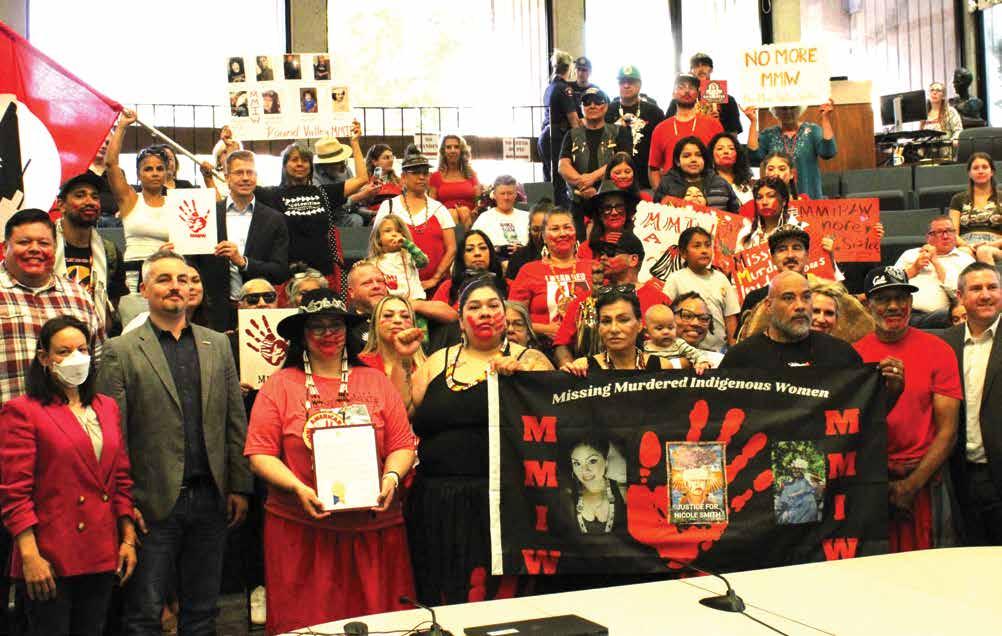
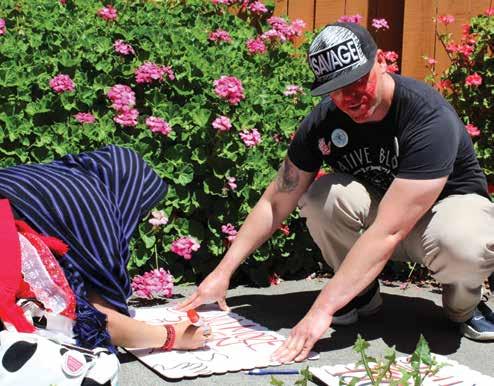
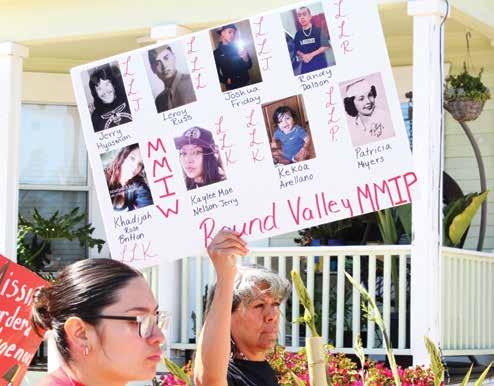
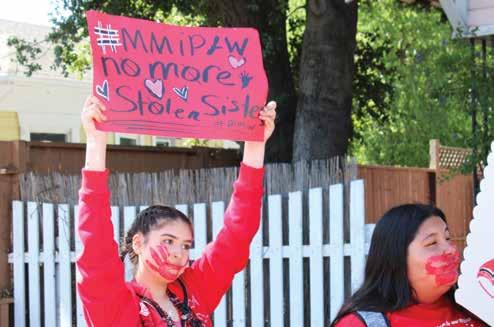

5 Community News, Youth Voices www.richmondpulse.org June 2024
“Anybody who has a kind and sympathetic heart can appreciate the fact that countless Indigenous women and people have gone missing and are murdered without any investigation,” said Jonny Brouillard, whose hat is reclaiming a word long used to dehumanize and vilify Native people.
“This MMIW, MMIP crisis has been happening for years,” said Redemption House of the Bay Area co-founder Lisa Diaz-McQuaid, not pictured.
At the May 8 Santa Rosa City Council meeting, MaDonna Feather Cruz holds the Missing and Murdered Indigenous Persons Awareness Day proclamation, on which she played a leading role.
“Taking one woman out of our society — it’s continuing the genocide,” said Charlie Toledo, not pictured.
Before the march, some attendees honored those they have lost to the missing and murdered Indigenous people crisis by speaking about their lives.
They Were Right, Junior Year Sucks
COMMENTARY • MARIANA CALVARIO
Editor’s note: After seeing a column in the L.A. Times by the parent of a teenager that claims “junior year is the worst,” we wanted to hear how actual juniors feel about their second-to-last year of high school. For one student at Richmond’s Kennedy High, junior year stress is compounded by worries about her and her parents’ future and lingering effects of the pandemic. Here’s what she had to say.
Since the beginning of high school, people have told me how difficult junior year was. I didn’t start to believe it until the people who I was surrounded by were complaining about junior year, while essentially being in it. But even then, I didn’t really think about it; it was an afterthought. Now, being a junior, I can see what they meant when they say that junior year, overall, sucked. The amount of pressue when you think about the future is horrible, because it is closer than you think.
As meaningless as it sounds, I care a lot about my grades. People have said it’s unhealthy the way I care about them. What people don’t seem to understand is that I’ve always been like this — I’ve always cared about my grades to the point where sometimes I would even spend hours crying over one stupid test score.
People fail to realize that most first-gen (American) students are like this; they push themselves because of their parents until they physically and mentally get sick. Students will not tell you how much pressure they’re put under on a daily basis, but I can express to you how pressure controls my life. My parents have always pressured me to do well in school because I would be the reason why their sacrifice was even worth it. What I mean by this is that I’m basically their retirement plan, like so many other first-generation students are their parents’ retirement plan.
The pressure has grown immensely over time, the older I got and the higher level of education I was in. This school year, I have put the same pressure — if not more — on myself about my grades, making sure I don’t get anything lower than a B. I am enrolled in four AP classes, and I work on the weekends. To be on top of
Divest...
Continued from page 2
means that a candidate can win without receiving a majority of votes. In this system, a voter picks one candidate for each seat.
In Richmond’s last election for council members and the mayor, for example, council member Doria Robinson and Mayor Eduardo Martinez did not receive a majority of votes in their respective races. Votes to Robinson’s two opponents totaled 60% of votes and Martinez’s three opponents also received 60% between them.
Ranked-choice voting would mean that a candidate elected to office would always receive a majority of votes. If no candidate receives a majority of firstchoice votes, then whichever candidate received the fewest votes is no longer considered. Those who voted for that candidate as their first choice have their second-choice vote count toward another candidate to see if a majority can be reached. The process lasts until a majority is reached.
Proponents say ranked-choice voting encourages civil discourse and diversity among candidates.
Jim Lindsay, co-founder of California Ranked Choice Voting, said his town of Albany’s use of ranked-choice voting led to an Asian council member being elected and attracted more Asian and young voters because of the diversity of candidates.
Ranked-choice voting has also been used in Berkeley, Oakland and San Francisco. •
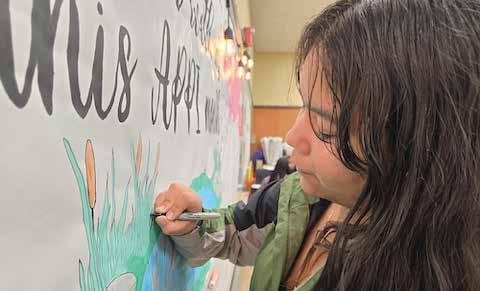
everything, I have to give up an extensive amount free time, which I have realized is very unhealthy. Yet you’ll never find me without work in front of my face. Even when I don’t have assignments, I’m studying; when I do have assignments, I do them on my breaks at work. You can imagine how bad it is.
Another crucial obstacle that I have faced is grasping the fact that I am growing up. I am 16, in 11th grade, and I just have one more year to enjoy my youth before I have to go to college and actually have to worry about of all the financial issues that will be brought up upon me.
Considering that the COVID-19 pandemic started right before I was able to finish seventh grade, it didn’t allow me to grown mentally and socially since I wasn’t allowed to attend school in person for over a year. This is still affects me because now I could not care less about social gatherings. In fact, I hate them; I’d rather be at home studying or doing my homework. Quarantine is where I truly started to care about my grades. I didn’t want to be behind, so I would do anything possible to pass my classes. This would play a big role in my unhealthy study habits.
I’ve always been controllilng about my own personal life. I don’t like to be disorganized; it stresses me out.
Clean Slate...
Continued from page 3
off the streets,” said Anaya.
Donnie Diego, a graduate of the Alpha Program, said he could not manage the adversity caused by his incarceration alone. After getting help, he wanted to pay it forward.
“They say in recovery that you can’t keep it unless you give it away… I got the tools from places like this to do further work,” he said. “If it wasn’t for the resources available to me back then, I don’t know if I would have made it.”
Once facing 30 years in prison, Diego said the programs drastically changed his life.
“I used to be a really big drug dealer, and prior to this, I was actually the floor manager of a major strip club in San Francisco,” he said. “If you were to tell me I’d be in the industry of helping people… I would have laughed.”
Now, he is a peer support specialist and drug and alcohol counselor.
He described seeing people he’s helped whose “spirits are no longer broken.”
“That light at the end of the tunnel is no longer a train coming toward them; it’s a way out,” he said. “If you’re stuck in that mentality, you might feel like you lack ability and have insecurity about doing something different.”
He and Fussell said those with criminal records are often victims of their environment.
“They didn’t just wake up one morning and decide they want to rob a bank; it’s the upbringing, the neighborhood, how you were raised,” said Fussell. They also said parole officers need to more frequently let people know what help is available.
CSP and RSC will host their Welcome Home Block Party Reentry Community Resource and Employment Fair on July 20 in Richmond. •
Thus, I’ve known what I want to do after high school from a very young age. But I didn’t really pick out what I wanted to do; it was pushed upon me, but I came to accept it.
My parents have always wanted me to become a lawyer. They wanted me to become powerful enough to help people like them — people who needed help the most but aren’t able to obtain it. Hearing this continuously growing up made me actually want to pursue being a lawyer.
I have been taking advanced classes not only to prepare myself for my future career but also to expand my knowledge. I have also applied for a summer Pennslyvania pre-law program, which will also help me prepare for law school. Although I do feel worried about choosing this path because it’s going to consume all of my life, I’m not as worried about it as I used to be. I truly believe with everything inside of me that this is what I want to do: I want to help other people and allow their voices to be heard. I want to help people not be afraid of living their daily lives. I want to change people’s lives for the better. •






6 Community News, Youth Voices www.richmondpulse.org June 2024
Support Richmond Pulse! Scan the QR code above to go to our donation page. ( Community Media for Richmond, CA Youth Voices,
MITZI PÉREZ-CARO
Mariana Calvario was a junior at Kennedy High School in Richmond this past school year.




‘The Last Bit of Solace’: Disaporic Palestinians Use Music
to Bring Support
BY SAMANTHA KENNEDY
T
arik Kazaleh heard bombs dropping around his best friend. All he could do was play the oud, a Middle Eastern stringed instrument, over the phone for someone thousands of miles away.
Kazaleh watches the suffering of those in Gaza from afar like other Palestinians in the diaspora. Protests and calls for a ceasefire in the Israel-Hamas war are closer to home, but the issue is more than political for Palestinian Americans. The loneliness and sadness carried through generations — and those feelings originating in their lifetimes — lead some diasporic Palestinians to use music as a way to cope.
“I was the last bit of solace,” he said. “I’m like, ‘F—, is this the sum of my work — to allay misery?’ ”
Since Hamas’ attack on Israel on Oct. 7, 2023, and Israel’s ensuing attacks in Gaza, more than 30,000 Palestinians have been killed. The death and grief are not new. For the Palestinian diaspora in the U.S., which is home to one of the largest populations outside of the Middle East, sympathies for Palestinians have historically been low.
However, as the wave of pro-Palestinian protests on college campuses suggests, attitudes are shifting among younger Americans. Pew research this year found that American adults under 30, particularly those who are Democrats or lean Democratic, are more likely to sympathize with the Palestinian people than the Israeli people.
Palestinian American musicians are on a mission to keep turning the tide.
Kazaleh, who is now in his early 40s and lives in Martinez, felt rejected growing up between Detroit and the Bay Area. Why was he a sand n-word? A kid said so. Why was being Palestinian impossible? A teacher said so.
As he faced rejection, Kazaleh found the perfect escape — music: playing Metallica and ska on the guitar, then listening to Public Enemy and having MC battles with his little brother. He became one of the country’s first Palestinian American producers and hip-hop MC, known as Excentrik.
Using his voice as a Palestinian artist, he says, is a way to inspire those who might otherwise feel isolated.
“We need more people that are willing to stand up and speak,” he said. “That’s why it’s important because no one else is going to do it for us.”
Other Palestinian American artists say they have faced
Pogo Park Wins Big State Funding to Build Community Emergency Center
BY RUTH DUSSEAULT | BAY CITY NEWS
After winning a highly competitive state grant, one small nonprofit will build a new recreation center this year that will double as an emergency shelter during climate and other emergencies.
With a $10 million Community Resilience Center grant, Pogo Park — a Richmond nonprofit with a mission to transform lives by transforming public spaces — will construct Contra Costa County’s first CRC at Harbour-8 Park. Harbour-8 is a two-block park on the Richmond Greenway, which is a 2.5-mile trail landscaped with community gardens and art.
“This CRC grant is a game-changer for Richmond,” said Toody Maher, Pogo Park executive director. “It will create a world-class CRC in a neighborhood with the highest need for emergency services and preparedness.”
Funds for the CRC grant program came from the California Strategic Growth Council, a cabinet-level committee established in 2008 via Senate Bill 732. It’s tasked with achieving sustainability, equity, economic prosperity and quality of life for Californians.
In Richmond, construction is already underway for the Harbour Hall, and it’s expected to be completed by the end of the year, said Maher. She explained that plans for building the hall had already taken shape thanks to a previous California State Parks grant, but winning
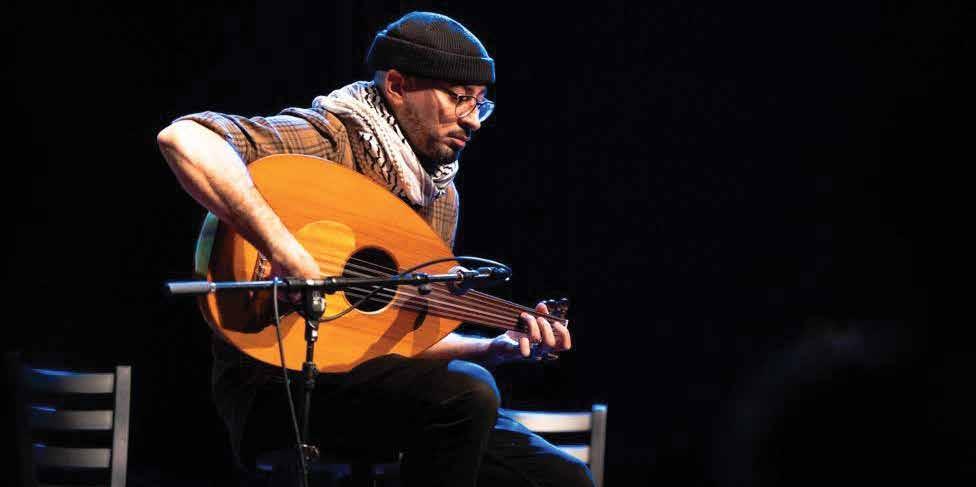
intimidation and backlash in response to their work, particularly regarding anti-zionist themes but found a haven in music.
Ten years ago, Camellia Boutros was 19 and teaching music to Palestinian children. She would sometimes stand on a Nablus mountain, watching Israeli missiles go into Gaza. Boutros, who lived in Santa Cruz at the time, visited during the 2014 Israel-Hamas war, during which more than 2,000 Palestinians were killed. That’s when she learned to play the oud.
“(The oud) changed the way I thought about music,” she said. Boutros calls it her “heart instrument.” “It’s something about the tone, the way it invites people in.”
The oud is special in Middle Eastern music. It resembles a European lute, though it pre-dates that, and is one of the most commonly used instruments in the genre.
Shortly after Boutros returned to the U.S., she felt paranoid. She had been doxxed by a website that compiles information on anti-zionist college students and faculty, for participating in a meeting to overturn the invalidation of a divestment from companies that were “complicit in the severe violation of human rights.”
Doxxing is publishing the personal information of another without their consent and often with the goal of harming them in some way. Many other Palestinians and their supporters have been doxxed on the same site as Boutros.
“What kind of brought me out of the paranoia was having community around me and realizing I was valued for other things in my life, like my music,” she said.
Music was always in Boutros’ life — piano lessons at 5, guitar at 8, trumpet at 12. Only after her time in Palestine did her Palestinian identity began to greatly influence her music.
the CRC funding gave Pogo Park the ability to further upgrade the facility to make it equipped to serve the community during emergencies.
She recalled the Chevron Richmond Refinery fire in 2015 and how 300 people flooded Pogo Park’s Elm Playlot because everyone knew it was being run by people from the community.
“When we were building the community center, our Pogo Park team of residents said, ‘Look what happened with Chevron in 2015. You know they’re going to be coming to this park. So we should really be ready for emergencies — to have the backup power, the best food,'” Maher explained. “So sure enough, this CRC grant opportunity came up, and the Pogo team of residents were really saying, ‘Look, here’s our chance to turn the hall — this new hall that is being built now — to make the upgrades to make it into a CRC.'”
The $10 million project will include $6 million for physical infrastructure, $3 million for programs and events, and $1 million for evaluation and general program support.
Part of the design enhancements include a commercial-grade kitchen, which can be used to prepare food during emergencies, but also serve the community year-round to support cooking classes, or to be used by vendors who wish to sell food from carts but need to be connected to a commercial kitchen, Maher explained.
Enhancements also include retrofitting the 3,500-square-foot community center under construction now to provide back-up power, water, communication and support during emergencies; a green landscaping to filter stormwater, and an information station in the middle of the park.
CRCs provide shelter and resources during climate and other emergencies, as well as year-round services and programming that strengthen community connections and build resilience.
As part of Gov. Gavin Newsom’s $48 billion California
“It was seeping into me,” she said. “Even in my dreams in Palestine, I was getting songs just handed to me.”
After the Oct. 7 attacks, Boutros, now a San Francisco resident, got through her heartbreaks with music.
“That’s how I get through my day,” she said. It’s also how she doesn’t “fall completely in a pit of total depression. It’s a way of transforming something heavy, difficult into something beautiful.”
Kazaleh also took to music in response to Oct. 7, creating the song “Gaza Gaza” with his brother, known as Rithmatik. The song is not just an acknowledgment of the suffering and death in Gaza but also Kazaleh’s hope of a free Palestine.
In their political and musical work, which often is intertwined, the push for a free Palestine for Boutros and Kazaleh boils down to equal rights and freedom.
“To be an anti-zionist, to be working for the freedom of the Palestinians is a call, to me, for equal rights for all who call that place home, which is definitely not what the case is today,” said Boutros.
The two know music is not enough to achieve freedom or to overcome all grief.
“As long as the genocide is continuing and the ethnic cleansing is continuing, the grief is going to continue,” said Boutros. “You can’t write yourself out of it.”
“There’s also a feeling of helplessness,” Kazaleh said. “There’s a futility to being an artist sometimes.”
Still, hope remains.
“Over time, we’re seeing more (solidarity),” said Boutros, “and it gives me hope that one day, despite all the injustice that’s happening, there will be freedom and equality (for) Palestine.”
You can find Kazaleh’s music on SoundCloud and Boutros’ on Bandcamp and both on Spotify. •
Climate Commitment, the CRC grant aims to build climate resilience in California’s most underserved communities.
The highly competitive statewide grant garnered nearly 200 applicants, and Pogo Park was only one of nine CRC implementation projects recommended for funding. Maher expressed excitement that her small nonprofit was able to win a state grant going up against entire municipalities and other large agencies.
To make Harbour Hall a reality, Pogo Park worked alongside partners, including the city of Richmond, the Iron Triangle Neighborhood Council and Richmond CERT.
“Pogo Park will be a critical partner in facilitating the expansion and implementation of emergency preparedness programs and initiatives in the Iron Triangle community,” said Richard Diaz, Richmond Emergency Services manager.
Richmond Council member Soheila Bana said the impact from this investment in public safety will raise awareness throughout the community and the larger county, while providing “a model to local governments from the entire county and beyond as a practical solution.”
James Anderson, local resident and Pogo Park staff member, said watching the community change and develop has been amazing.
“Having a place where people in the Iron Triangle can go during an emergency makes me and my family feel safe,” Anderson said. “Being part of Pogo Park’s efforts to improve Richmond is truly a blessing.”
Copyright © 2024 Bay City News, Inc. All rights reserved. Republication, rebroadcast or redistribution without the express written consent of Bay City News, Inc. is prohibited. Bay City News is a 24/7 news service covering the greater Bay Area. •
8 Community News, Youth Voices www.richmondpulse.org June 2024
Tarik Kazaleh, a Palestinian American musician also known as Excentrik, plays a Middle Eastern instrument called the oud
(Photo by Jim McCambridge, courtesy of Tarik Kazaleh)


 BY DENIS PEREZ-BRAVO
BY DENIS PEREZ-BRAVO






 BY JOE PORELLO
BY JOE PORELLO













